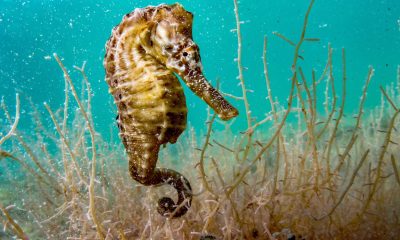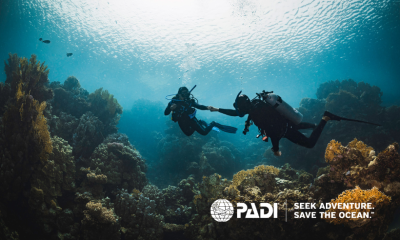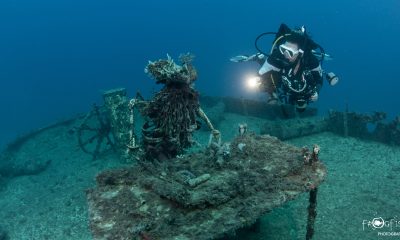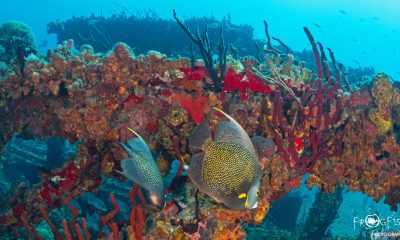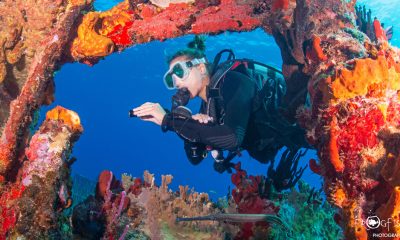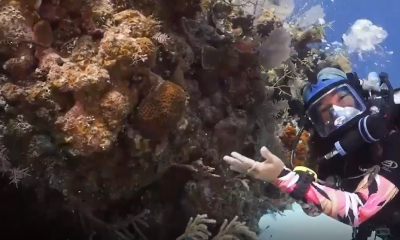News
Vital Caribbean shark population to be better protected
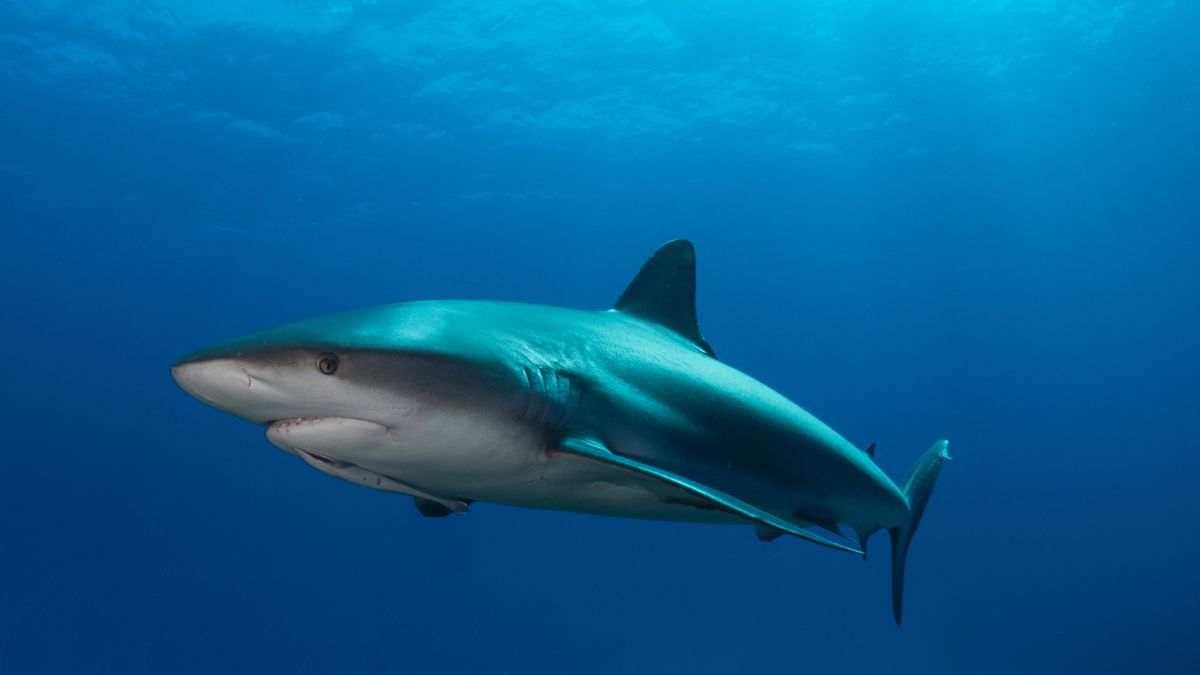
The Marine Conservation Society are delighted to announce that they will be part of a new project funded by the UK Government which will be protecting shark populations in the Caribbean.
They will be working directly with organisations in both the Caribbean and the UK to ensure that local shark populations are protected in the waters around Anguilla, one of the UK’s overseas territories. Thanks to a grant awarded by the UK Government’s Darwin Plus initiative, which provides vital funding in overseas territories, work will be carried out to better understand shark populations around these East Caribbean islands. As apex predators, the sharks sit at the top of the food chain, and play a critical role in marine ecosystem recovery and resilience.
Amdeep Sanghera, UK Overseas Territories Conservation Officer at the Marine Conservation Society, said: “We are absolutely thrilled to have received vital Darwin Plus funding for this exciting project. By undertaking the first ever assessments of sharks in Anguilla, we’ll better understand the status of these keystone predators.”
Amdeep goes on to explain why the work is so critical: “Atlantic shark populations have declined by as much as 90% in recent decades, including in the Caribbean region which is home to at least 40 shark species. By undertaking the first ever assessments of sharks in Anguilla, we’ll better understand the status of these keystone predators.”
“This project will develop priority conservation actions to support conservation of Anguilla’s shark populations, with local communities fully engaged in creating these solutions.”
Working alongside the Anguilla National Trust and the Government of Anguilla’s Fisheries and Marine Resources Unit, scientific aspects of the project will be guided by University of Exeter’s Dr Matt Witt who is an Associate Professor in Natural Environment.
The programme will include deploying baited remote underwater cameras (BRUVs) in shallow and deep-water habitats to support the first ever ecological shark assessment in Anguilla.
“We will offer our expertise in underwater camera systems to improve knowledge for these incredibly important, but often much maligned, species,” Dr Matt Witt, University of Exeter explained.
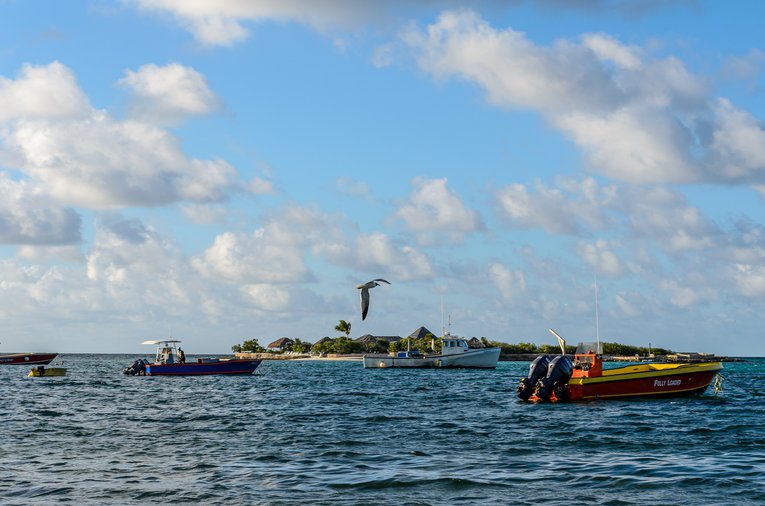
Fishing boats in the Caribbean Sea off the coast of the Anguillan islands
Credit: Steve Adams via Unsplash
An international collaboration
The Marine Conservation Society will use their successful Community Voice Method of engagement and, working in partnership with the Fisheries and Marine Resources Unit in Anguilla will work directly with the local community to understand how they live alongside the sharks, and to ensure that those who live and work around the islands have their opinions included in the project.
The collaboration between local residents and government departments, and UK scientists and the Marine Conservation Society will be central to the drafting of a national shark Species Action Plan to safeguard these invaluable creatures for generations to come.
“This is the first time that we’ll be partnering with MCS and the University of Exeter,” said Farah Mukhida, Executive Director, Anguilla National Trust .
“With their extensive experience, expertise, and commitment to evidence-based marine conservation, we’re looking forward to developing local capacity as we work together with the Government of Anguilla to conserve some of the world’s most misunderstood and feared species. An assessment of Anguilla’s shark species populations, and Anguillians’ attitudes towards sharks has been missing and it’s a much needed area of research.”
“With fear of sharks still widespread today, a need exists to sensitise the Anguillan public on this matter. Fisheries Unit is happy to be a part of this project, and looks forward to engaging all stakeholders to assist with changing people’s attitudes towards shark conservation” Kafi Gumbs, Director, Fisheries and Marine Resources Unit, said.
To find out more about the Marine Conservation Society visit their website by clicking here.
Header image: Caribbean Reef Shark by Frogfish Photography
News
Seahorse National Park announced on Eleuthera in The Bahamas
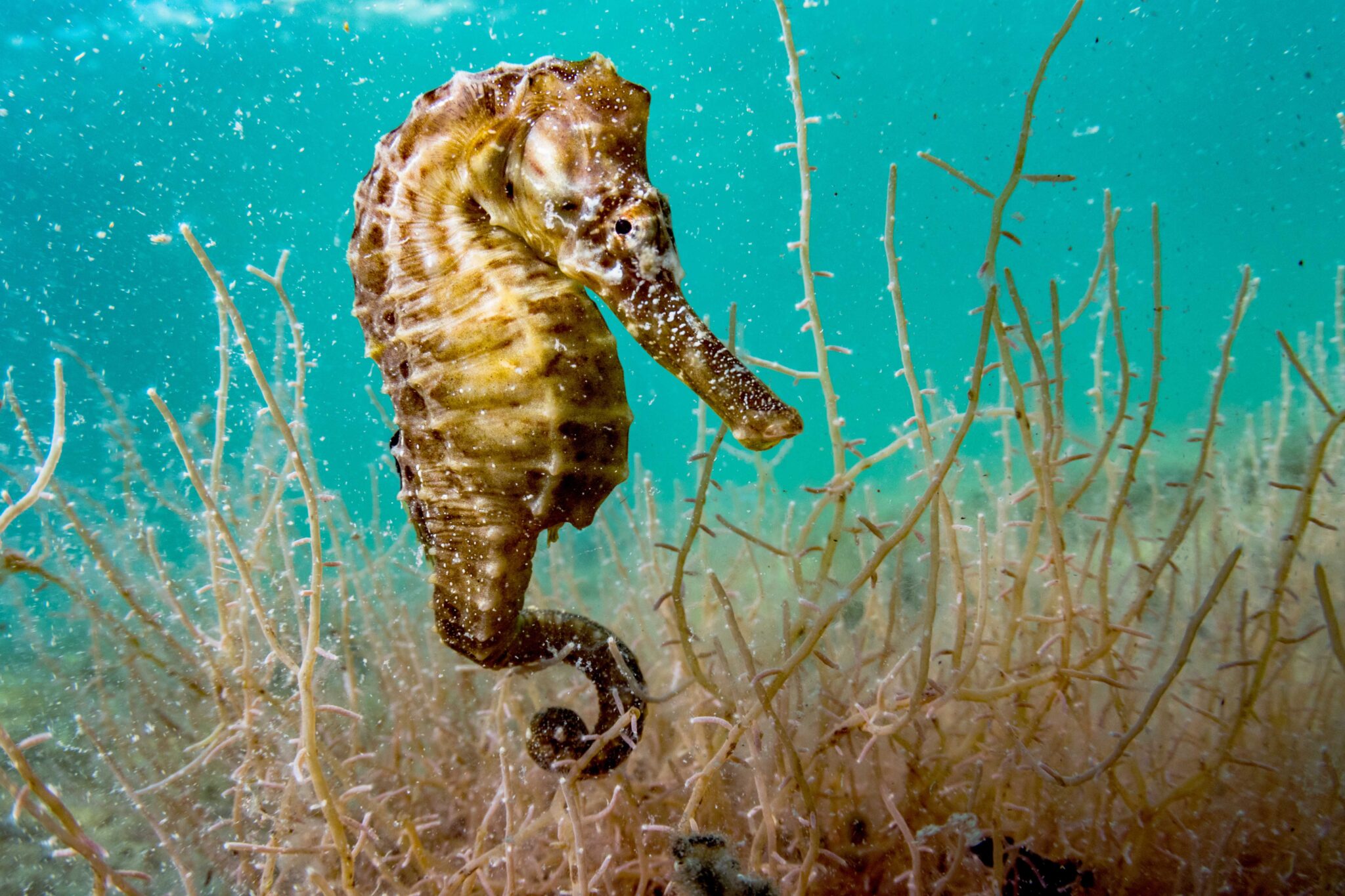
This week has seen the announcement of the designation of Seahorse National Park at Hatchet Bay Cave and Sweetings Pond on Eleuthera. This monumental announcement comes after years of efforts from the BNT and its partners in advocating for the protection of Sweetings Pond and its surrounding areas as an official national park under the BNT’s management.
Sweetings Pond is a large, land-locked saltwater pond in Hatchet Bay, Eleuthera. It has many unique natural features, but the most notable of them all is its incredible seahorse population, which is believed to be the densest population of seahorses in the world. The new 548-acre national park protects the entire one-mile-long pond and the surrounding terrestrial area. The land surrounding Sweetings Pond is a blend of intact coppice, mangroves, and farmlands. In addition, the new national park includes the extensive Hatchet Bay Caves system. This historic cave system is a popular attraction and contains a number of impressive geological features. It is one of the longest dry cave systems in The Bahamas.
Since 2014, the BNT has been leading efforts to have the area declared as a national park. This included years of public outreach and stakeholder consultations in communities across Eleuthera; education presentations in local schools; science and research efforts; and engaging consecutive government administrations. In 2018, the BNT submitted the “20 by 20 Marine Protection Plan” to the government, which included the recommendation to declare Sweetings Pond and other areas in The Bahamas as protected areas.
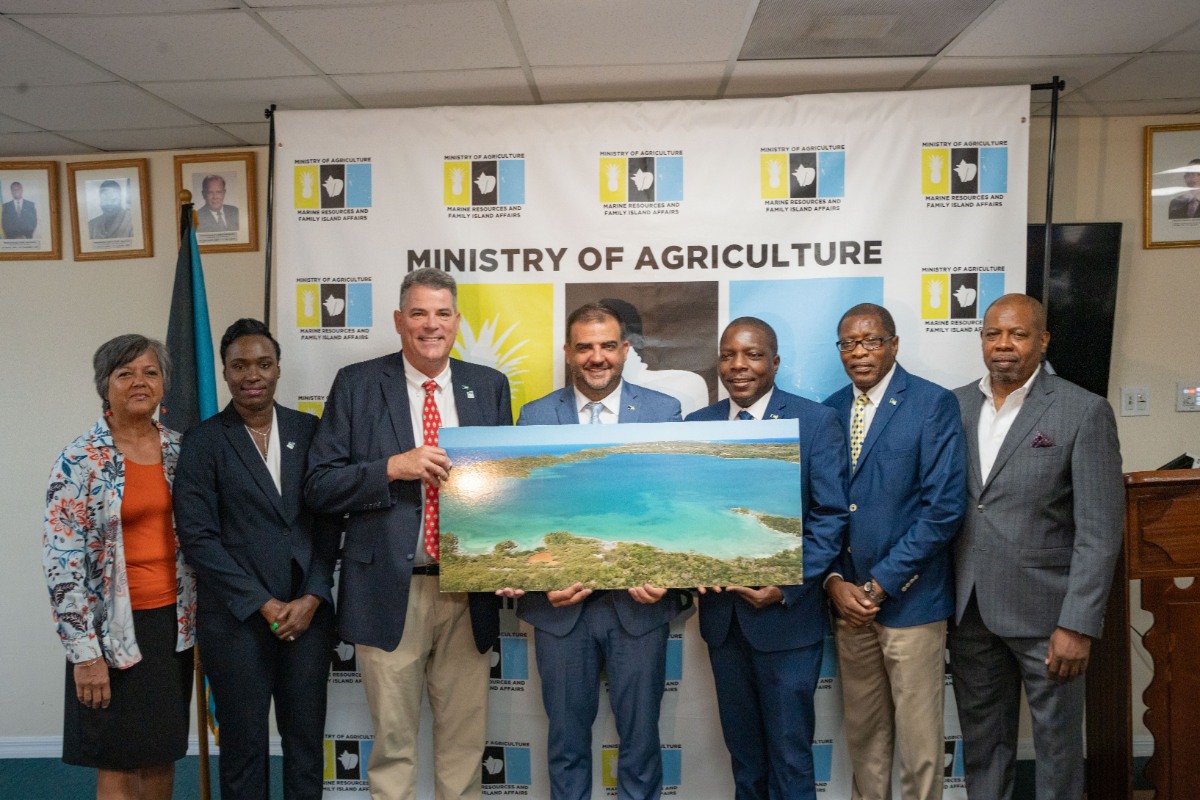
During the lease signing ceremony for Seahorse National Park, Minister Clay Sweeting, said, “This lease agreement for Sweetings Pond has been a long time coming. It represents a milestone in our journey towards sustainable development. It symbolises our collective responsibility to safeguard our natural heritage and create a harmonious relationship between economic progress and environmental preservation.
“I would like to express my gratitude to all stakeholders in this process of drafting and finalising this lease agreement. Their dedication, expertise, and commitment has been crucial in ensuring that this agreement falls in line with our vision of creating a thriving ecosystem while promoting responsible usage. Let us continue to preserve the jewel that is Sweetings Pond for many generations to come.”
The BNT invites the public to stay tuned for more news about its plan for the country’s newest national park: Seahorse National Park at Hatchet Bay Cave and Sweetings Pond!
To learn more about the role the BNT plays in managing terrestrial and marine national parks, conserving wildlife, and informing environmental policy, please visit its website: www.bnt.bs
Follow/subscribe to its various social media channels: Facebook, Instagram, Twitter, and YouTube.
Banner Image: A lined seahorse (Hippocampus erectus), female, clining to algae in an alkaline pond in The Bahamas by Shane Gross
News
PADI Club invites Ocean Lovers on exclusive dive trip to Bonaire this September
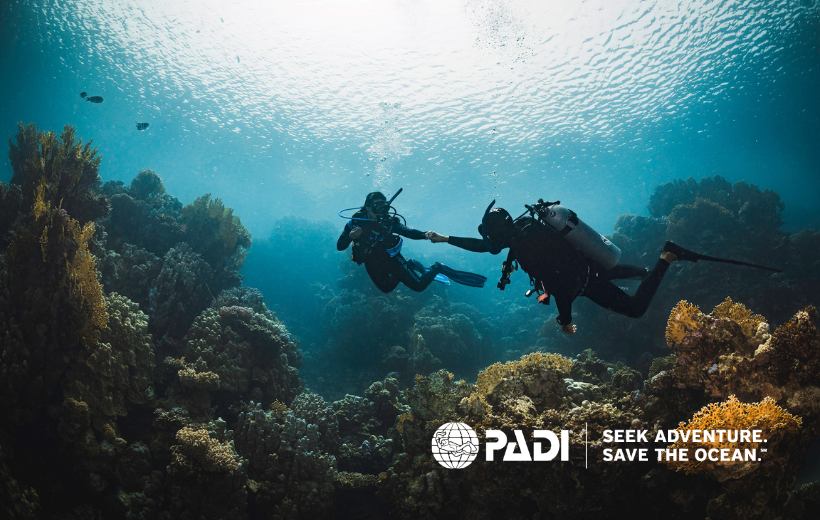
Following the popularity of the PADI Club trip to Belize at the end of July, a second “dive trip of a lifetime” has just been announced by PADI Club to Bonaire this September 23-30, 2023.
Offered exclusively for PADI Club members as part of their yearly benefits, attendees will get to seek adventure while staying at the all-inclusive Buddy Dive Resort, one of PADI’s premier members on the island. Other PADI Members in Bonaire – including Toucan Divers, Divi Flamingo, Wanna Dive, Dive Friends and Scuba Do – will also be hosting various dive experiences throughout the week.
“Bonaire is a unique and beautiful gem in the Dutch Caribbean and we want to show our Club Members this little island looms large as a dive destination,” says Zach Pavkov, PADI Club Operations Manager. “This trip offers participants a chance to not only explore a world-class diving destination but do so through some of the very best PADI Operators.”
PADI Club members will receive a generous discount for this seven-day diving adventure, with packages starting at $1,739 per diver for double occupancy.
Included in the package are:
- social events that include hosted dinners, cocktail parties and live music
- transportation in Buddy Dive Resort’s famous pick-up truck
- daily shore diving and boat diving
- accommodation, with the option to share a room with another solo diver or rent out one, two and three-bedroom apartments to host larger groups of divers
- surface interval activities that include PADI Seminars and island excursions like hiking and bird-watching.
“Because the water surrounding Bonaire has been an established marine park for 44 years, Bonaire is now a top-ranked destination with abundant marine life that includes scorpionfish, flounder and frogfish, moray eels, hawksbill turtles and eagle rays, ” continues Pavkov.
With limited spots available, the list of participants will be decided on a first-come, first-served basis. Those who are not yet PADI Club Members but are interested in joining the trip can sign-up, which will also give them access to:
- 20% of PADI eLearning® programs and PADI Gear™
- a free ReActivate® online refresher
- a free DAN® Prepared Diver course
- a subscription to Scuba Diving® magazine
- access to the PADI Club Celebrity Speaker Series webinars
- brand partner benefits from GoPro, Uber, Salt Life and more
To further support ocean lovers to create positive ocean change, five percent of the PADI Club membership fee will go towards supporting conservation efforts around the globe.
“PADI Club benefits are designed not just to empower divers to explore the ocean, but also enable them to play a pivotal role in saving the ocean too,” says Pavkov. “This year’s additional expedition to Bonaire gives our community the chance to come together and explore our shared blue planet in a truly meaningful and connected way.”
Click here to sign up for PADI Club and reserve your spot here to join the Bonaire dive trip.



